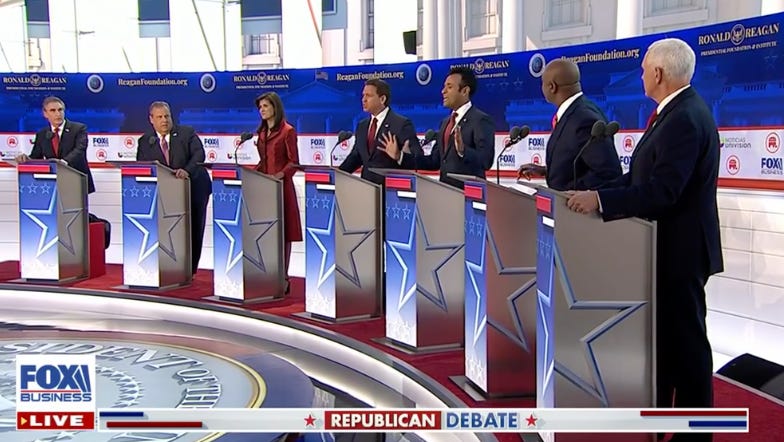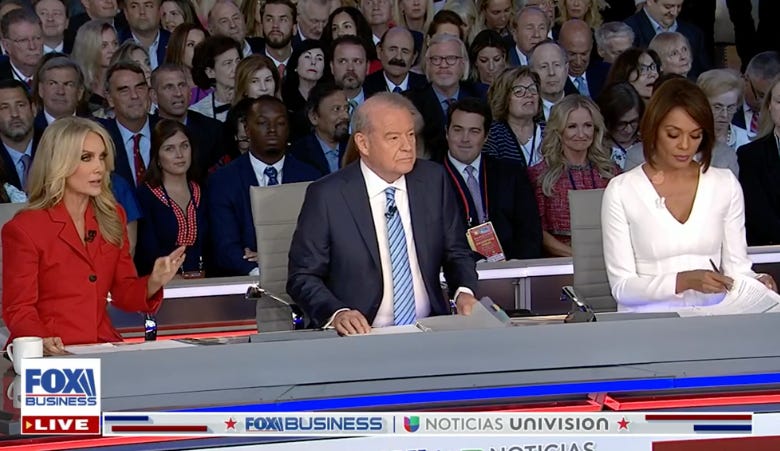A somewhat less organized version of a thing that doesn't matter all that much
Quick reactions to the second Republican presidential debate
The second Republican presidential debate of 2023 differed from the first one in a number of important ways, but here’s one thing that hasn’t changed: Donald Trump’s dominance of the overall contest.
That is, just like last time, the candidates who were actually on the debate stage put in valiant efforts to be the one who is trailing Trump by less than 30 points. They are competing for the role of understudy — the one who might be the party’s alternative if the criminal justice system or the 14th amendment or illness or something else makes Trump unavailable to serve as the presidential nominee next year. Given the array of impediments Trump faces, it’s appropriate that the party is having this conversation, but it’s still a strange sort of shadow contest.
Since the last time the candidates debated, the threats to Trump have continued to mount. A judge ruled Tuesday that Trump had committed fraud. A lawsuit to bar him from the ballot is working its way through the Colorado courts. The four major indictments against Trump continue to move toward 2024 trials. The odds of him being a convicted felon by the time of the election, if not the Republican National Convention, are growing quite strong. Yet that has shown no negative effect on his odds of becoming the Republican nominee, and may have even improved those odds slightly over the past month.
Now, given all that, we can still evaluate how the other candidates on the stage looked in this debate. In general, this was a far more raucous and less well-run debate. The three moderators fumbled their lines quite a bit and seemed to have little interest in keeping the candidates on task (unlike the Fox News moderators in August, who did this fairly well). There were lots of split-screen shots of two candidates yelling over each other while several other candidates attempted to yell over them from off-camera. Conversely, while the candidates were more belligerent and energetic than last time, the audience was far less so. Candidates trying to play to the audience were rarely rewarded for it, and none learned this lesson harder than Mike Pence. I’ll get to that. But let me briefly run through how the candidates performed, in roughly declining order of their success.
Nikki Haley had a pretty solid performance, on par with the previous debate. (She is, notably, the only candidate who saw some upward movement in her polls after the last debate.) As with several candidates, her strongest moments were when she was kicking Vivek Ramaswamy around. “Every time I hear you, I feel a little bit dumber” is a good debate line! But just in general, she reliably comes off well on foreign policy questions, speaks with a great deal of authority and clarity on Russia, and rarely gives the impression of being unprepared or uncomfortable with a topic.
I’m going to give Ron DeSantis a solid second place on this one. He improved considerably over his first debate performance. And while he did occasionally veer into some paranoid areas and refused to take a simple L on the controversy about slavery’s portrayal in Florida curricula, he was quite skilled at making an affirmative case for his own electability. He argued, convincingly, that Republicans had lost three successive national elections under Trump’s leadership, while he had turned a swing state bright red under his own governance. It’s the best argument for his nomination, and he had clearly rehearsed it and delivered it pretty well. Calling out Trump for being missing in action struck me as a good way to criticize Trump without going after anything Trump’s supporters really like about him. And his Reaganesque gesture of brandishing his veto pen while threatening government spending was a nice touch.
Chris Christie really gets the theater of a debate better than anyone else up there. The part where he addressed Donald Trump by looking directly into the camera, while announcing he was doing exactly that, and then coming up with a corny insult like Donald Duck, was totally campy and still terribly entertaining and effective. And it worked; Trump jumped at the bait and responded on social media. Christie’s lines about being pro-life for someone’s whole life, and about taking care of drug addicts even while bashing drug dealers, nicely distinguished himself from the field. No, he’s still going nowhere with this, but whatever he’s doing, he’s doing it about as well as can be done.
Most of us were younger than Mike Pence is now when we told our first sex joke, so perhaps we should offer him a bit of grace. But you could see the moment where he briefly hesitated to tell a joke about shtupping a teacher and thought, “Wait, should I really continue with this joke? Yes, gosh darn it, fortune favors the bold!” And this thing died like a skinny-dipper off Amity Island. I’ve seen red shirts in early Star Trek episodes with better prospects than Pence’s joke. The audience looked at that joke like Reviewer 2 looks at a qualitative methods piece by a junior professor at a liberal arts college. My university should offer counseling for me and my students who had to watch a stage death like that.
All that out of my system, Pence did get in a few sassy and well-planned zingers. He wasn’t as good as he was in the last debate but not bad overall.
Tim Scott had a much better night than he did last month. He was far more forceful in controlling stage time, and he managed to get off a few solid policy claims rather than get bogged down in stories. He made a rather striking claim about race: He said that Black people “survived” slavery,1 but had a far harder time with LBJ’s Great Society programs, and concluded that the USA is not a racist country. I still don’t see a path for Scott’s nomination, but a Black southerner telling largely white Republican audience that the country is not a racist one is delivering an extremely validating applause line.
I still struggle with how to rate Vivek Ramaswamy. His goal in the first debate was very clearly to get people talking about him by any means necessary, and he succeeded wildly. He seemed to be going for that as well in this debate, but that strikes me as maybe not enough of a goal at this point. He leaned into his youthfulness by trying to reach younger voters, but did so in weird ways, like warning about the dangers of buying Percocet on Snapchat, or defending his use of TikTok even while saying kids under 16 should be banned from using it, or conceding that he sometimes sounds like a know-it-all. He continues to excel at pissing off the other candidates, and at this point it doesn’t seem like an act anymore; they really hate him.
I found Doug Burgum a lot more interesting last month, when he was likely on a ton of painkillers. He was really struggling in this debate to get noticed, and had some pretty rambling policy statements when he did.
Looking forward to the third debate in November!
Let’s talk about survivorship bias some time.






